Complete Works of Robert Louis Stevenson (Illustrated)
THE COMPLETE WORKS OF
ROBERT LOUIS STEVENSON
(1850-1894)
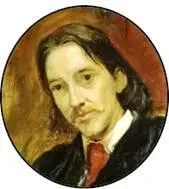
Contents
The Novels
TREASURE ISLAND
THE BLACK ARROW
PRINCE OTTO
THE STRANGE CASE OF DR. JEKYLL AND MR. HYDE
KIDNAPPED
THE MASTER OF BALLANTRAE
THE WRONG BOX
THE WRECKER
CATRIONA
THE EBB-TIDE
WEIR OF HERMISTON
ST. IVES
The Unfinished Novels
HEATHERCAT
THE GREAT NORTH ROAD
THE YOUNG CHEVALIER
The Short Story Collections
NEW ARABIAN NIGHTS
MORE NEW ARABIAN NIGHTS - THE DYNAMITER
THE MERRY MEN AND OTHER TALES AND FABLES
ISLAND NIGHTS’ ENTERTAINMENTS
FABLES
TALES AND FANTASIES
The Short Stories
CHRONOLGOICAL LIST OF SHORT STORIES
ALPHABETICAL LIST OF SHORT STORIES
The Poetry Collections
A CHILD’S GARDEN OF VERSES
UNDERWOODS
BALLADS
SONGS OF TRAVEL AND OTHER VERSES
ADDITIONAL POEMS
The Poems
CHRONOLOGICAL LIST OF POEMS
ALPHABETICAL LIST OF POEMS
The Plays
DEACON BRODIE
BEAU AUSTIN
ADMIRAL GUINEA
MACAIRE
THE CHARITY BAZAAR
The Travel Writing
AN INLAND VOYAGE
TRAVELS WITH A DONKEY IN THE CEVENNES
A MOUNTAIN TOWN IN FRANCE
EDINBURGH: PICTURESQUE NOTES
THE AMATEUR EMIGRANT
ACROSS THE PLAINS
THE SILVERADO SQUATTERS
THE OLD AND NEW PACIFIC CAPITALS
The Non-Fiction
VIRGINIBUS PUERISQUE AND OTHER PAPERS
FAMILIAR STUDIES OF MEN AND BOOKS
MEMORIES AND PORTRAITS
MEMOIR OF FLEEMING JENKIN
RECORDS OF A FAMILY OF ENGINEERS
ADDITIONAL MEMORIES AND PORTRAITS
LATER ESSAYS
LAY MORALS
PRAYERS WRITTEN FOR FAMILY USE AT VAILIMA
A FOOTNOTE TO HISTORY
IN THE SOUTH SEAS
LETTERS FROM SAMOA
LETTERS TO YOUNG PEOPLE
JUVENILIA AND OTHER PAPERS
PIERRE JEAN DE BÉRANGER ARTICLE
THE COMPLETE LETTERS
The Biographies
THE LIFE OF ROBERT LOUIS STEVENSON By Sir Graham Balfour
THE LIFE OF ROBERT LOUIS STEVENSON FOR BOYS AND GIRLS By Jacqueline M. Overton
THE LIFE OF MRS. ROBERT LOUIS STEVENSON By Nellie Van De Grift Sanchez

© Delphi Classics 2012
Version 3

THE COMPLETE WORKS OF
ROBERT LOUIS STEVENSON
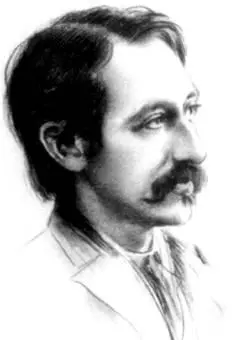
Interested in Robert Louis Stevenson?
Then you’ll love this collection…
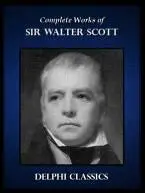
Sir Walter Scott is Scotland’s leading classic novelist and the Father of the Historical novel. Ever since the phenomenal success of his first novel Waverley, Scott has entertained readers across the world for nearly two centuries.
For the first time ever, Scott’s complete and prolific works are available in digital format, with hundreds of beautiful illustrations and many bonus texts.
The Novels
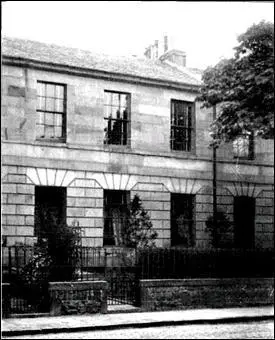
No. 8 Howard Place, Edinburgh, Stevenson’s birthplace
TREASURE ISLAND

Stevenson’s most famous work was first published as a serial in the children’s magazine Young Folks between 1881–82. A coming-of-age story, the novel is an adventure tale known for its atmosphere, character and action. The anti-hero, due to his ambiguity of his morality, Long John Silver is an unusual component in children’s literature. This work is one of the most frequently dramatised of all Victorian novels and the influence of Treasure Island on popular perception of pirates is vast, including treasure maps with an “X”, schooners, the Black Spot, tropical islands, and one-legged seamen with parrots on their shoulders.
The novel opens in a seaside village in south-west England in the mid-18th century. The narrator, Jim Hawkins, is the young son of the owners of the Admiral Benbow Inn. An old drunken seaman named Billy Bones becomes a long-term lodger at the inn, only paying for the first week of his stay. Sooner than later, the secrets he hides have life changing effects on Hawkins and his family.
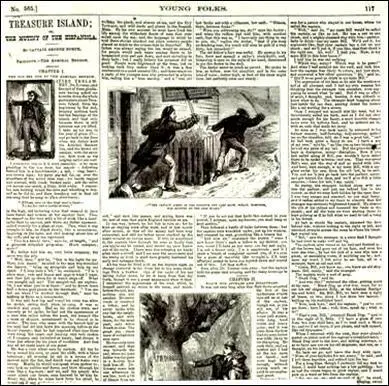
How the novel first appeared in the serial ‘Young Folks’
To
LLOYD OSBOURNE
An American Gentleman
In accordance with whose classic taste
The following narrative has been designed
It is now, in return for numerous delightful hours
And with the kindest wishes, dedicated
By his affectionate friend
THE AUTHOR
CONTENTS
PART I THE OLD BUCCANEER
CHAPTER I AT THE “ADMIRAL BENBOW”
CHAPTER II BLACK DOG APPEARS AND DISAPPEARS
CHAPTER III THE BLACK SPOT
CHAPTER IV THE SEA-CHEST
CHAPTER V THE LAST OF THE BLIND MAN
CHAPTER VI THE CAPTAIN’S PAPERS
PART II THE SEA-COOK
CHAPTER VII I GO TO BRISTOL
CHAPTER VIII AT THE SIGN OF THE “SPY-GLASS”
CHAPTER IX POWDER AND ARMS
CHAPTER X THE VOYAGE
CHAPTER XI WHAT I HEARD IN THE APPLE BARREL
CHAPTER XII COUNCIL OF WAR
PART III MY SHORE ADVENTURE
CHAPTER XIII HOW MY SHORE ADVENTURE BEGAN
CHAPTER XIV THE FIRST BLOW
CHAPTER XV THE MAN OF THE ISLAND
PART IV THE STOCKADE
CHAPTER XVI NARRATIVE CONTINUED BY THE DOCTOR — HOW THE SHIP WAS ABANDONED
CHAPTER XVII NARRATIVE CONTINUED BY THE DOCTOR — THE JOLLY-BOAT’S LAST TRIP
CHAPTER XVIII NARRATIVE CONTINUED BY THE DOCTOR — END OF THE FIRST DAY’S FIGHTING
CHAPTER XIX NARRATIVE RESUMED BY JIM HAWKINS — THE GARRISON IN THE STOCKADE
CHAPTER XX SILVER’S EMBASSY
CHAPTER XXI THE ATTACK
PART V MY SEA ADVENTURE
CHAPTER XXII HOW MY SEA ADVENTURE BEGAN
CHAPTER XXIII THE EBB-TIDE RUNS
CHAPTER XXIV THE CRUISE OF THE CORACLE
CHAPTER XXV I STRIKE THE JOLLY ROGER
CHAPTER XXVI ISRAEL HANDS
CHAPTER XXVII “PIECES OF EIGHT”
PART VI CAPTAIN SILVER
CHAPTER XXVIII IN THE ENEMY’S CAMP
CHAPTER XXIX THE BLACK SPOT AGAIN
CHAPTER XXX ON PAROLE
CHAPTER XXXI THE TREASURE-HUNT — FLINT’S POINTER
CHAPTER XXXII THE TREASURE-HUNT — THE VOICE AMONG THE TREES
CHAPTER XXXIII THE FALL OF A CHIEFTAIN
CHAPTER XXXIV AND LAST
PART I
THE OLD BUCCANEER

CHAPTER I
AT THE “ADMIRAL BENBOW”
Squire Trelawney, Doctor Livesey, and the rest of these gentlemen having asked me to write down the whole particulars about Treasure Island, from the beginning to the end, keeping nothing back but the bearings of the island, and that only because there is still treasure not yet lifted, I take up my pen in the year of grace 17 — , and go back to the time when my father kept the “Admiral Benbow” Inn, and the brown old seaman, with the saber cut, first took up his lodging under our roof.
I remember him as if it were yesterday, as he came plodding to the inn door, his sea-chest following behind him in a hand-barrow; a tall, strong, heavy, nut-brown man; his tarry pig-tail falling over the shoulders of his soiled blue coat; his hands ragged and scarred, with black, broken nails, and the saber cut across one cheek, a dirty, livid white. I remember him looking round the cove and whistling to himself as he did so, and then breaking out in that old sea-song that he sang so often afterwards:
“Fifteen men on the dead man’s chest,
Yo-ho-ho and a bottle of rum!”
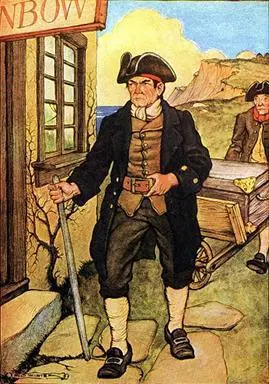
I remember him as if it were yesterday as he came plodding to the inn door
in the high, old tottering voice that seemed to have been tuned and broken at the capstan bars. Then he rapped on the door with a bit of stick like a handspike that he carried, and when my father appeared, called roughly for a glass of rum. This, when it was brought to him, he drank slowly, like a connoisseur, lingering on the taste, and still looking about him at the cliffs and up at our signboard.
“This is a handy cove,” says he, at length; “and a pleasant sittyated grog-shop. Much company, mate?”
My father told him no, very little company, the more was the pity.
“Well, then,” said he, “this is the berth for me. Here you, matey,” he cried to the man who trundled the barrow; “bring up alongside and help up my chest. I’ll stay here a bit,” he continued. “I’m a plain man; rum and bacon and eggs is what I want, and that head up there for to watch ships off. What you mought call me? You mought call me captain. Oh, I see what you’re at — there”; and he threw down three or four gold pieces on the threshold. “You can tell me when I’ve worked through that,” said he, looking as fierce as a commander.
And, indeed, bad as his clothes were, and coarsely as he spoke, he had none of the appearance of a man who sailed before the mast, but seemed like a mate or skipper, accustomed to be obeyed or to strike. The man who came with the barrow told us the mail had set him down the morning before at the “Royal George”; that he had inquired what inns there were along the coast, and hearing ours well spoken of, I suppose, and described as lonely, had chosen it from the others for his place of residence. And that was all we could learn of our guest.
He was a very silent man by custom. All day he hung round the cove, or upon the cliffs, with a brass telescope; all evening he sat in a corner of the parlor next the fire, and drank rum and water very strong. Mostly he would not speak when spoken to; only look up sudden and fierce, and blow through his nose like a fog-horn; and we and the people who came about our house soon learned to let him be. Every day, when he came back from his stroll, he would ask if any seafaring men had gone by along the road. At first we thought it was the want of company of his own kind that made him ask this question; but at last we began to see he was desirous to avoid them. When a seaman put up at the “Admiral Benbow” (as now and then some did, making by the coast road for Bristol), he would look in at him through the curtained door before he entered the parlor; and he was always sure to be as silent as a mouse when any such was present. For me, at least, there was no secret about the matter; for I was, in a way, a sharer in his alarms.
He had taken me aside one day and promised me a silver fourpenny on the first of every month if I would only keep my “weather eye open for a seafaring man with one leg,” and let him know the moment he appeared. Often enough when the first of the month came round, and I applied to him for my wage, he would only blow through his nose at me, and stare me down; but before the week was out he was sure to think better of it, bring me my fourpenny piece, and repeat his orders to look out for “the seafaring man with one leg.”
How that personage haunted my dreams, I need scarcely tell you.
1 comment